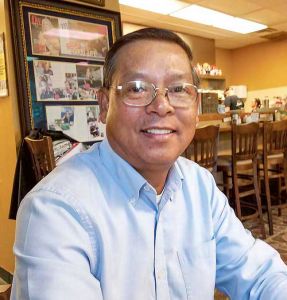Some readers didn’t much care for my column last week advising skepticism on Ken Burns’ new PBS series on “The Vietnam War.” I understand that, and am not surprised some would think of me sympathetically as trying to justify my role as a young man in what they have been taught was a horrible mistake. But the truth is I am cautioning readers, not rationalizing.
Consider what a few other Vietnam vets had to say.
Mike Roman, Director of History and Special Projects for the Johns Creek Veterans Association, had to reflect a little on why the Burns film disturbed him.
He said, “What was missing was the broadly felt pride of service. I volunteered to join the Army, volunteered to go to Vietnam, volunteered to stay for 19 months, and since I became good at my job I think that saved some lives. I would do it again, like the other vets I know, but I don’t think you will see guys like us in the Burns film, proud of their service like the vast majority of other Vietnam veterans.”
Rick White, who spent 24 months in the jungles of Vietnam, was troubled by the preview he saw of Burns’ documentary. He said, “It seemed to have two overall themes: America is bad, and Vietnam vets are victims. Both are wrong. I am proud of my service and proud of my country. Now, the agenda-driven documentary episodes have revived old and deep feelings of resentment and betrayal. All those years ago, my men were putting their life on the line for their country, for the freedom to do and say even unpopular things. But the protestors back home who exercised those freedoms didn’t seem to feel any responsibilities. They were getting my men killed by giving aid and comfort to the enemy.”
Rick spoke to his buddy Tommy Clack, who is president and chairman of the board of the “Walk of Heroes” Veterans War Memorial located in Rockdale County, Ga. Tommy lost both legs and an arm when hit by an RPG in Vietnam. Clack told Rick, “After I was interviewed by Burn’s team, I was told directly by Ken Burns that he they said they would not be using my part since, ‘I was too positive about our generation and my pride in my service in the Vietnam War.’”
There is much discontent among Vietnam vets about Burns’ documentary.
When I talk to students about the Vietnam War, I tell them it is probably the most misunderstood event in American history because of the heated political controversy, and that their parents and grandparents know things for sure about Vietnam that have never been true – because that’s what they were taught by academia and the left-leaning media.
I also tell them the Vietnam War was complex, that it changed over time, and the experience varied among vets by timeframe and depending on whether they were at relatively safe bases or out in the “field” where combat could happen at any time, whether they were in the flat rice paddy country of the Mekong Delta, mountainous triple-canopy jungle, central highlands or near coastal cities further north near the DMZ at the 17th parallel.
I also tell them honest and informed people can disagree whether we should have ever been in Vietnam in the first place, and the trouble starts with those key words “honest” and “informed.”
For my own version, and I tell them it is opinion vs. fact, America taking a stand in Vietnam trying to stop the spread of Communism in Southeast Asia was a noble cause, but there is a second half to that, a flip side which requires a little background.
Anyone with half a brain regarding war knows it requires overwhelming force to prevail, and best to get it done quickly to lock in victory without unnecessary casualties. In Vietnam, first President Kennedy then President Johnson imposed rules of “limited war” which gave our enemy safe haven in neighboring Laos and Cambodia, where they built the Ho Chi Minh Trail to deliver tools of war against the South Vietnamese and Americans.
These rules tied the hands of Americans, like requiring permission from higher-ups to fire on the enemy; protecting the enemy’s Haiphong harbor where Soviet ships delivered mass quantities of weapons and other essentials for war; forbidding the overwhelming force we could have used to win at a number of points.
Our enemy’s military leader, Giap, long after the war, said in the aftermath of their Tet offensive of 1968, their losses were so heavy, if we had continued the bombing instead of stopping, as Johnson did repeatedly in a futile effort to get a good will response, North Vietnam might have quit the war. But the bombing did stop and he was encouraged to revive the fight by the fury of anti-war protests in the U.S.
Even though our enemy negotiated a cease fire for Tet then attacked in treachery on that holiday all over the country, our defensive counterattacks were portrayed by the media as an unfortunate expansion of the war. Walter Cronkite of CBS, the “most trusted man in America,” returned from his personal view of the Tet aftermath and told America the war was unwinnable.
Popular support dwindled. Many Vietnam vets dislike Cronkite for that, but as I tell students, maybe he was right. If the President and the Pentagon would not get rid of the stupid rules on how we were fighting the war, maybe it was not winnable.
And that is the important flip side. As I tell students, we could have won that war, but with the stupid rules preventing victory and making it last forever, we turned it into a meat grinder that ate young men and, if that couldn’t change, maybe we should have stayed out of it altogether.
There is a good bit of true history in Ken Burns’ documentary, but there is a lot of bias, too, that clearly presents his leftist views. He obviously selected interviewees that feed his narrative, and viewers might never realize he is concealing vital components of the truth.
A number of vets I know are not just disappointed in Burns’ series, but disgusted, and refuse to watch any more. That is because they always have been proud of their service, even when jeering anti-war crowds said unspeakable things to them as they returned home through California airports from Vietnam – where their country had sent them.
A Veterans Administration study a number of years ago found that over 90 percent of Vietnam vets were proud of their service, and over 70 percent would do it again, even knowing the outcome. You won’t see those guys interviewed in Burns’ documentary.
Here’s why I would do it again. I was doing my duty when my country called. Flying helicopter gunships, when I engaged the enemy I was protecting my brothers on the ground, and many times my grunt brothers would live through that day because we were there.
That was our motivation to climb in the cockpit after a bad day, or while worrying this might be our fatal mission. We were doing our best amidst stupid rules, and I wouldn’t want to miss flying with the finest young pilots America never knew, 21-year-old brave and skilled young men who flew into enemy fire again and again for our brothers on the ground, guys who created close air support tactics for helicopters and passed on to those who followed, along with some tricks of staying alive in the cockpit.
You won’t see the guys in Burns’ film proud of having been there and helping the Vietnamese people in many ways, like me collecting contributions on payday to buy clothes and food for the local orphanage in Bien Hoa.

Burns won’t show you guys like Anh Nguyen of Peachtree City, who remembers the Tet of 1968 battle of Hue when he was 12 years old, fleeing his Hue home and hiding with his family in fear after the enemy’s surprise attack took the city, the friendly loudspeaker after hiding 21 days, telling them it was safe to return to their homes, and what Anh says is the most beautiful sight he has ever seen, rows of U.S. Marines on either side of Highway 1, waving them along while they stood guard after enduring a terrible battle.
You won’t see the political officers in every enemy unit down to the platoon level, guiding the NVA and Viet Cong use of atrocities to accomplish their goals, the beheadings of village chiefs, disemboweling their wives, cutting hands off their children, all while villagers had been gathered to watch and learn when they said “Give us your sons,” they weren’t kidding.
Burns will show you and highlight American war crimes, which were rare, but won’t show you enemy war crimes that were regular daily occurrences, planned and required by enemy leadership.
If you don’t know the subject well, and not many do, you won’t notice errors or omissions. In episode 1 alone, Burns repeatedly portrayed the enemy leader, Ho Chi Minh (HCM), as a nationalist driven to push the foreigners out and unify Vietnam as a free country. Not true at all. HCM was chased out of Vietnam, spent decades of indoctrination in Moscow and Mao’s China, was a founder of the French Communist party, founded other Asian Communist movements, and was always disguising himself as a nationalist to conceal his commitment to Communist world domination. He even changed his name more than 10 times to conceal who he was.
HCM did the classical communist maneuver of purging (murdering) his competitors. He made the Trotskyites – moderates among communists – disappear in North Vietnam. While Burns mentioned briefly “land reforms,” he skipped the brutal murderous methods HCM used in North Vietnam to solidify his power.
From village to village, HCM’s squads would gather the people and put “land-owners” on trial for the crime of owning property, always found guilty then publicly executed in the most creatively gruesome ways, another classic Communist tactic of cementing power by use of terror.
HCM disguised his Communist intent by quoting Thomas Jefferson and the Declaration of Independence, not unlike Cuba’s Castro quoting America’s founding fathers. Burns points the finger of blame at America for reneging on planned 1956 reunification elections and he is dead wrong. The parties signing an agreement at the 1954 Geneva Accords were the French and their enemy, the Viet Minh led by HCM. The north had a population advantage, elections in the north couldn’t be trusted given that prior “elections” in the north, where the Communists ruled with an iron fist, had given HCM far more than 100 percent of the vote, and HCM rejected America’s proposal of UN monitors on any vote. So America and free South Vietnam, neither being a party to the agreement, declined to play the rigged game.
By mixing facts with leftist distortions, like repeatedly stating the war was clearly unwinnable even before America became directly involved, Burns and PBS are driving the anti-war left’s stake through the heart of history. The leftist version is being made official among those who buy the PBS description of Ken Burns as “America’s storyteller.”
Fits right in with the current passion for revision of history, doesn’t it?
[Terry Garlock of Peachtree City occasionally contributes a column to The Citizen.]












Leave a Comment
You must be logged in to post a comment.